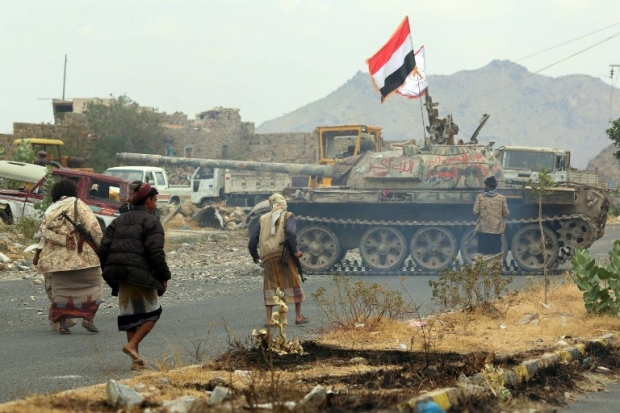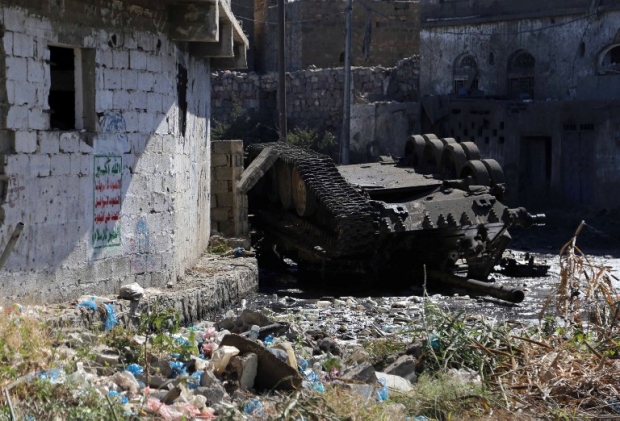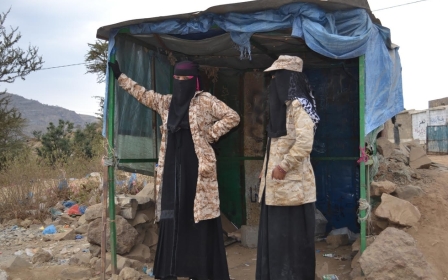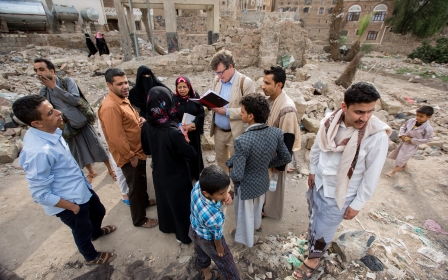Shooting and looting: 'Liberated' Taiz residents say they have lost everything
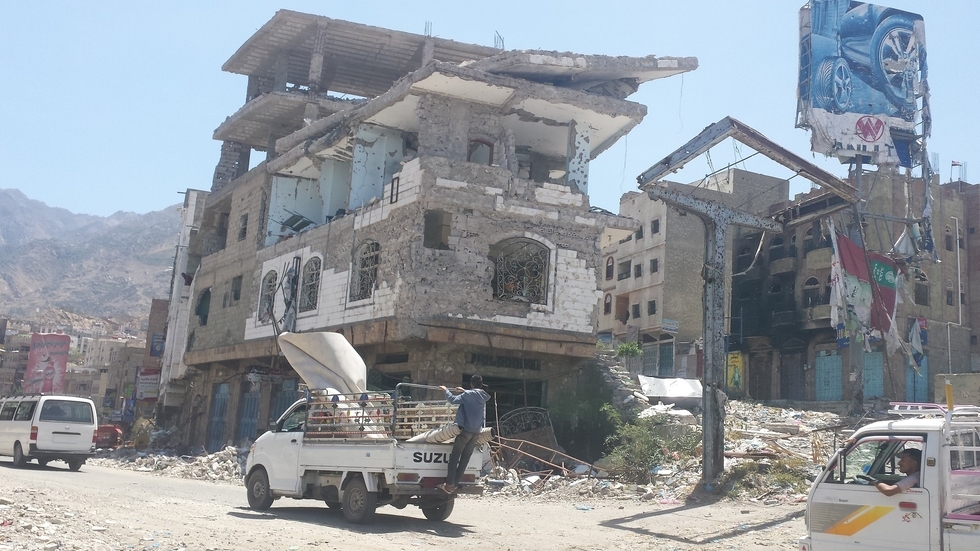
TAIZ, Yemen – For two years, 65-year-old Abbas al-Hwaidi had refused to leave his home in the al-Askri neighbourhood in the east of Taiz city even as war between Houthi rebels and Popular Resistance fighters raged nearby.
But when the fighting finally arrived in al-Askri in November 2016, Hwaidi and his wife, his two sons and their wives and their five children fled with all the jewellery, computers and clothes they could carry.
The family went to stay with a cousin in nearby Ibb city, but Hwaidi could not stop thinking about the home and the furniture and other possessions he had left behind.
Most of his neighbours had also packed up and left, although one nearby household had left a single guard, Salem (not his real name), behind to keep an eye on things.
On 17 November, al-Askri was declared liberated by the Popular Resistance, which was formed to fight the Houthis after Yemeni President Abd Rabbuh Mansour Hadi was exiled in 2015.
READ: Popular Resistance asserts control in Taiz
But a day later, Hwaidi received confirmation of the news he had been dreading.
“Salem, who had been guarding the other house, phoned me and told me that thieves had broken into my house and looted everything inside it. They even broke off the doors of the rooms,” Hwaidi told Middle East Eye.
'I am an old man, but I have encouraged my sons to take their children and leave Yemen and go anywhere else'
Abbas al-Hwaidi
As he spoke he became so tearful that he paused for a while before continuing his story. Now retired and with neither of his sons currently in work, he said he did not know how the family would ever be able to replace all that they had lost.
“I spent more than 15 years building this house, and then my sons completed the building, and now we have lost everything at once,” he added.
Hwaidi said he had his suspicions about who had looted his house but preferred not make accusations because of fears of reprisals: “I will pray for revenge. May Allah take revenge for me on the thieves.”
READ: Yemen on verge of 'absolute collapse' suggests report
He added that he had lost all hope that Yemen would ever be peaceful again.
“I am an old man, but I have encouraged my sons to take their children and leave Yemen and go anywhere else, as Yemen will remain as a conflict zone forever.”
“The fighters of the resistance used shelling to break the doors of houses and looted everything inside.”
Salem said he had persuaded the fighters not to enter the house that he had been guarding by telling them that there were women and children inside.
He added that he preferred not to be identified by his real name because of security concerns.
“I cannot trust either the Houthis or the resistance to control my city, as both of them do not care about the civilians,” he said.
'They told me my car was with a Houthi fighter and when I showed them the papers, they accused me of being a Houthi supporter'
Nafal Ali, Taiz resident
Other residents from eastern areas recaptured by the resistance have also complained of looting and say that they have been unable to recover their belongings even when they have been able to locate them.
Nafal Ali, a resident of the Sala neighborhood, fled with his family at the beginning of last month, leaving his car behind as all roads were blocked by the fighting.
“Like many residents, I left my furniture at my house and my car was in the yard. But thieves stormed the house and looted everything and took my car,” he told MEE.
Ali found his car with a member of the resistance, but he could not get it back.
“They told me my car was with a Houthi fighter and when I showed them the papers, they accused me of being a Houthi supporter. So to spare myself any trouble I let them keep the car.”
Thieves among fighters
Resistance leaders in Taiz admitted that looting in recaptured areas had been a problem but said that there was little they could do to protect houses because their most trusted soldiers are still busy fighting.
“Usually some fighters come after the liberation of these areas to loot the houses of civilians, and those fighters may be fighters with the resistance, but they do not fight on the frontlines and they are originally thieves,” Nael al-Adimi, a leader of the resistance in Taiz city, told MEE.
“Now we cannot punish those thieves, as we are busy with the liberation of the city, but the investigations are ongoing and we will punish all thieves after the liberation.”
READ: Women play growing role for anti-Houthi forces
He confirmed that the punishment of some members of the resistance while the war was ongoing could hinder the advance. Thieves had their own supporters, he explained, and leaders preferred not to create disputes within the resistance for now.
'Investigations are ongoing and we will punish all thieves after the liberation'
Nael al-Adimi, resistance leader
Much of Taiz was captured by the Houthis in April 2015, but many people chose to continue living in the city because they were largely left alone by the occupying fighters.
But many residents of the eastern neighbourhoods forced out by the recent fighting are unable or unwilling to return to their homes now that the resistance has regained control.
Salem said that discontent with the resistance would grow if it failed to provide basic security and take action against looters.
“We live in areas under the control of the resistance, so the resistance is responsible for us, and it has to protect our houses and return our belongings, even if the thieves are not members of the resistance,” he said.
Fear of resistance
Fears about looting have also spread to Houthi-controlled areas of Taiz, where some residents told MEE they considered the Houthis to be their guards.
Anas al-Samei, a resident of Taiz's al-Hawban neighbourhood said he did not want to see the area become a conflict zone or fall under the control of the resistance.
“When the Houthis took over al-Hawban in March 2015, they did not loot our houses, but if the resistance liberates it, its fighters will loot and destroy our houses," Samei told MEE.
He pointed out that he supports a political solution to Yemen’s war, hoping that the resistance will stop fighting while the warring sides negotiate a peace settlement.
“I work as a mechanic in al-Hawban and live in a rental house and I am not willing to lose my work and furniture for the sake of liberation. War increases the suffering of civilians, so I hate all warring sides,” said Samei.
READ: The fake news the UK government has fed us about Yemen
Others in al-Hawban are already making plans to leave the city with their belongings and seek safety elsewhere.
Tameem Fadhl, 35, a bus driver from al-Hawban, said he had decided to leave with his family after hearing reports of the looting of civilian properties in areas captured by the resistance.
“I am not stupid enough to wait until thieves arrive at my house. I rented a house in Ibb and I’m working as a bus driver in Ibb,” Fadhl told MEE.
“I will not return to Taiz until the end of the war, as I will not put my family in danger.”
Sofa sale
While the cost of most basic commodities has risen as a consequence of the war, the price of second-hand furniture and household items has fallen sharply.
In the old city of Taiz, televisions, washing machines, tables, sofas, beds and all kind of furnishings can be found on sale for less than half of their original price.
While some families sold their possessions for economic reasons, most is assumed to be the spoils of looting.
Ahmed al-Miqdam, who owns a home furnishings store in Taiz city, confirmed that some fighters offered him second-hand items for less than the half of their value, but he declined to buy.
Most shops were struggling to sell their existing stock and had stopped importing new items, he told MEE.
“The markets are full of second-hand furniture. There are only a few people buying because of the war and most of them buy second-hand because it is cheap.”
MEE contributor is a byline used by journalists working in dangerous parts of the world where revealing their identities could jeopardise their safety.
Middle East Eye propose une couverture et une analyse indépendantes et incomparables du Moyen-Orient, de l’Afrique du Nord et d’autres régions du monde. Pour en savoir plus sur la reprise de ce contenu et les frais qui s’appliquent, veuillez remplir ce formulaire [en anglais]. Pour en savoir plus sur MEE, cliquez ici [en anglais].


